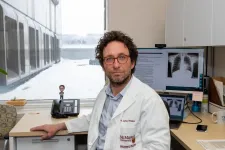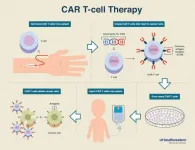These sea slugs sever their own heads and regenerate brand-new bodies
2021-03-08
(Press-News.org) You've heard of animals that can lose and then regenerate a tail or limb. But scientists reporting in the journal Current Biology on March 8 have now discovered two species of sacoglossan sea slug that can do even better, shedding and then regenerating a whole new body complete with the heart and other internal organs. The researchers also suggest that the slugs may use the photosynthetic ability of chloroplasts they incorporate from the algae in their diet to survive long enough for regeneration.
"We were surprised to see the head moving just after autotomy," said Sayaka Mitoh of Nara Women's University in Japan. "We thought that it would die soon without a heart and other important organs, but we were surprised again to find that it regenerated the whole body."
The discovery was a matter of pure serendipity. Mitoh is a PhD candidate in the lab of Yoichi Yusa. The Yusa lab raises sea slugs from eggs to study their life history traits. One day, Mitoh saw something unexpected: a sacoglossan individual moving around without its body. They even witnessed one individual doing this twice.
The researchers report that the head, separated from the heart and body, moved on its own immediately after the separation. Within days, the wound at the back of the head closed. The heads of relatively young slugs started to feed on algae within hours. They started regeneration of the heart within a week. Within about three weeks, regeneration was complete.
The heads of older individuals didn't feed and died in about 10 days. In either case, the cast-off bodies didn't regenerate a new head. But the headless bodies did move and react to being touched for several days or even months.
Mitoh and Yusa aren't sure how the sea slugs manage it. But, Mitoh says, they suspect there must be stem-like cells at the cut end of the neck that are capable of regenerating the body. It's also unclear why they would do this. One possibility is that it helps to remove internal parasites that inhibit their reproduction. They also don't know what immediate cue prompts them to cast off the rest of the body. These are areas for future study.
The sea slugs in question already were unique in that they incorporate chloroplasts from algae they eat into their own bodies, a habit known as kleptoplasty. It gives the animals an ability to fuel their bodies by photosynthesis. They suggest this ability might help them survive after autotomy (the casting off of a part of the body) long enough to regenerate a body.
These findings in sea slugs represent a new type of autotomy in which animals with complex body plans shed most of their body.
"As the shed body is often active for months, we may be able to study the mechanism and functions of kleptoplasty using living organs, tissues, or even cells," Mitoh said. "Such studies are almost completely lacking, as most studies on kleptoplasty in sacoglossans are done either at the genetic or individual levels."
INFORMATION:
Current Biology, Mitoh et al.: "Extreme autotomy and regeneration of the whole body in photosynthetic sea slugs" https://www.cell.com/current-biology/fulltext/S0960-9822(21)00047-6
Current Biology (@CurrentBiology), published by Cell Press, is a bimonthly journal that features papers across all areas of biology. Current Biology strives to foster communication across fields of biology, both by publishing important findings of general interest and through highly accessible front matter for non-specialists. Visit http://www.cell.com/current-biology. To receive Cell Press media alerts, contact press@cell.com.
ELSE PRESS RELEASES FROM THIS DATE:
2021-03-08
It's no secret that the United States' $13 billion cannabis industry is big business. Less obvious to many is the environmental toll this booming business is taking, in the form of greenhouse gas emissions from commercial, mostly indoor production.
A new study by Colorado State University researchers provides the most detailed accounting to date of the industry's carbon footprint, a sum around which there is only limited understanding. What is clear, though, is that consumer demand for cannabis is insatiable and shows no signs of stopping as more states sign on to legalization.
The study, ...
2021-03-08
The economic benefits of conserving or restoring natural sites "outweigh" the profit potential of converting them for intensive human use, according to the largest-ever study comparing the value of protecting nature at particular locations with that of exploiting it.
A research team led by the University of Cambridge and the Royal Society for the Protection of Birds (RSPB) analysed dozens of sites - from Kenya to Fiji and China to the UK - across six continents. A previous breakthrough study in 2002 only had information for five sites.
The findings, published in the journal Nature Sustainability, come just weeks after a landmark report by Cambridge Professor Partha Dasgupta called for the value of biodiversity to be placed at the heart of global economics.
For the latest ...
2021-03-08
Coastal populations are experiencing relative sea-level rise up to four times faster than the global average - according to new research from the University of East Anglia.
A new study published today in Nature Climate Change is the first to analyse global sea-level rise combined with measurements of sinking land.
The impact of subsidence combined with sea-level rise has until now been considered a local issue rather than a global one.
But the new study shows that coastal inhabitants are living with an average sea level rise of 7.8 mm - 9.9 mm per year over the past twenty years, compared with a global average rise of 2.6mm a year.
And the impacts are far larger than the global numbers reported ...
2021-03-08
LA JOLLA--(March 8, 2021) Deep learning is a potential tool for scientists to glean more detail from low-resolution images in microscopy, but it's often difficult to gather enough baseline data to train computers in the process. Now, a new method developed by scientists at the Salk Institute could make the technology more accessible--by taking high-resolution images, and artificially degrading them.
The new tool, which the researchers call a "crappifier," could make it significantly easier for scientists to get detailed images of cells or cellular structures that have previously been difficult to observe because they require low-light conditions, such as mitochondria, which can ...
2021-03-08
What The Study Did: Researchers assessed the number of hospital admissions for noncommunicable diseases (abnormal tissue growths, metabolic diseases, cardiovascular diseases and musculoskeletal diseases) in São Paulo, Brazil, between January and June last year compared with the corresponding periods in the previous three years.
Authors: Fernando Adami, Ph.D., of the Laboratório de Epidemiologia e Análise de Dados, Centro Universitário Saúde ABC in São Paulo, Brazil, is the corresponding author.
To access the embargoed study: Visit our For The Media website at this link https://media.jamanetwork.com/
(doi:10.1001/jamanetworkopen.2021.0799)
Editor's Note: Please ...
2021-03-08
Menlo Park, Calif. -- Scientists have taken a major step forward in harnessing machine learning to accelerate the design for better batteries: Instead of using it just to speed up scientific analysis by looking for patterns in data, as researchers generally do, they combined it with knowledge gained from experiments and equations guided by physics to discover and explain a process that shortens the lifetimes of fast-charging lithium-ion batteries.
It was the first time this approach, known as "scientific machine learning," has been applied to battery cycling, said Will Chueh, an associate ...
2021-03-08
Hamilton, ON (March 8, 2021) - Many parents know the struggle of having to make children with pneumonia finish the usual 10-day course in antibiotics despite the child feeling better after a few days of medication.
New research from McMaster University has proven that a five-day course of high-dose amoxicillin will do just as well for children six months to 10 years old with common pneumonia.
"Several studies have proven that adults with pneumonia do fine with short courses of antibiotics, and now we have proved a short course of antibiotics also works for children," said Dr. Jeffrey ...
2021-03-08
A study from North Carolina State University found outdoor play and nature-based activities helped buffer some of the negative mental health impacts of the COVID-19 pandemic for adolescents.
Researchers said the findings, published in the International Journal of Environmental Research and Public Health, point to outdoor play and nature-based activities as a tool to help teenagers cope with major stressors like the COVID-19 pandemic, as well as future natural disasters and other global stressors. Researchers also underscore the mental health implications of restricting outdoor recreation opportunities for adolescents, and the need to increase ...
2021-03-08
DALLAS - March 8, 2021 - A new type of CAR T-cell therapy more than triples the expected length of remission for multiple myeloma patients who have relapsed several times, according to an international clinical trial with UT Southwestern as the lead enrolling site.
Results of the trial, published recently in the New England Journal of Medicine, were significantly better than those seen with other therapies available to heavily relapsed and refractory myeloma patients who had already received the three main classes of treatment. Nearly three-quarters of the patients had at least a partial response to the therapy. About a third achieved a complete remission, with the disappearance of all traces of cancer.
Median time without the disease worsening was 8.8 months with this new ...
2021-03-08
A woman grips her purse tightly as you approach. A store manager follows you because you look "suspicious." You enter a high-end restaurant, and the staff assume you're applying for a job. You're called on in work meetings only when they're talking about diversity.
The indignities and humiliations Black men -- even those who have "made it" -- regularly endure have long been seen as part and parcel of life in the United States among the Black community, a sort of "Black tax" that takes a heavy toll on physical and mental health.
Now, a new UCLA-led study reveals these "hidden costs" of being Black in America. ...
LAST 30 PRESS RELEASES:
[Press-News.org] These sea slugs sever their own heads and regenerate brand-new bodies



